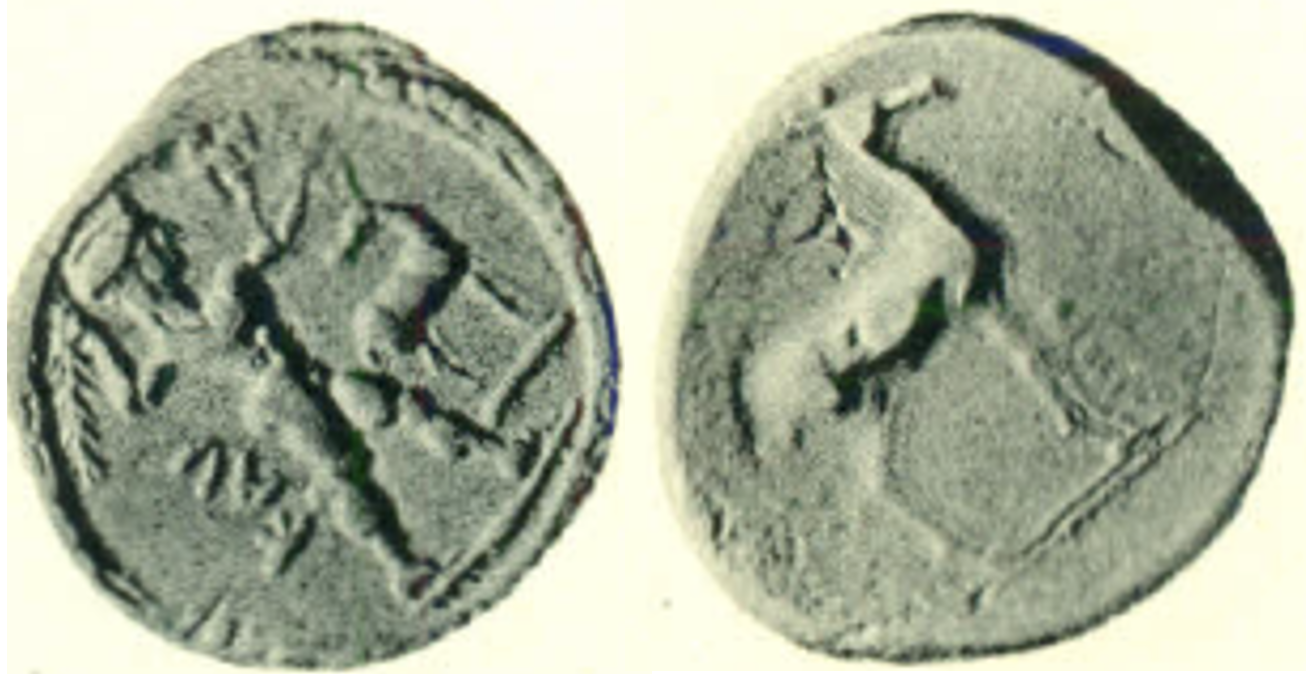2094 - Caulonia (nomos Apollo/stag) over Selinus (selinon leaf/incuse square) (New York, ANS)
From SILVER
| Line 16: | Line 16: | ||
|Metal=Silver | |Metal=Silver | ||
|Weight=7.80 | |Weight=7.80 | ||
| − | |Denomination= | + | |Denomination=nomos |
|Standard=Achaian (Hoover) | |Standard=Achaian (Hoover) | ||
|Coin reference=Noe 1957, p. 13-42, pl. V-XIV (group VI, p. 30, pl. X, a) | |Coin reference=Noe 1957, p. 13-42, pl. V-XIV (group VI, p. 30, pl. X, a) | ||
| Line 25: | Line 25: | ||
|Overstruck date from=500 BCE | |Overstruck date from=500 BCE | ||
|Overstruck date to=450 BCE | |Overstruck date to=450 BCE | ||
| + | |Overstruck period=Archaic; Classical | ||
| + | |Overstruck denomination=didrachm | ||
}} | }} | ||
Revision as of 20:26, 17 August 2023
475 BCE - 425 BCEΚΑV | ΚΑVΛ
Location/history
| Museum collectionMuseum collection: | New York, American Numismatic Society | |
| Archaeological contextArchaeological context: | South Italian Hoard |
Overstriking coin
Description
| ObverseInscription or printing placed on the obverse.: | ΚΑV (Greek) Apollo advancing right, naked, brandishing laurel branch with right hand, a small daimon running on outstretched left arm. In right field, stag standing right. | ReverseInscription or printing placed on the reverse.: | ΚΑVΛ (Greek) Stag standing right. |
Mint and issuing power
| MintIdentifies the place of manufacture or issue of a numismatic object.: | Caulonia | Ancient regionAncient region. | Bruttium | Modern countryModern country: Italy | AuthorityIdentifies the issuing power. The authority can be "pretended" when the name or the portrait of X is on the coin but he/she was not the issuing power. It can also be "uncertain" when there is no mention of X on the coin but he/she was the issuing power according to the historical sources: |
Chronology
| FromIdentifies the initial date in a range assigned in a numismatic context. 475 BCE toIdentifies the final date in a range assigned in a numismatic context.. 425 BCE | Classical 480-323 BC |
Physical description
| MetalThe physical material (usually metal) from which an object is made.: Silver |
WeightWeight of the numismatic object (in grams). in grams: 7.807.8 g <br />7,800 mg <br /> | DenominationTerm indicating the value of a numismatic object. Examples: tetradrachm, chalkous, denarius.: nomos | |
| StandardStandard.: Achaian (Hoover) | |||
References
| Coin referenceReference of the Coin: | Noe 1957, p. 13-42, pl. V-XIV (group VI, p. 30, pl. X, a) | Coin series referenceReference to coin series study: | SNG ANS/Sylloge Nummorum Graecorum1SNG ANS/Sylloge Nummorum Graecorum, USA, The Collection of the American Numismatic Society (9 vols.), New York, 1969-1998, n° 175-180., HN Italy2HN Italy, n° 2044, 2046, 2049, 2051-2152, HGC 13HGC 1, n° 1419 |
| Coin series web referenceCoin series web references: | |||
Overstruck type
Description
| ObverseInscription or printing placed on the obverse.: | ReverseInscription or printing placed on the reverse.: |
Mint and issuing power
| MintIdentifies the place of manufacture or issue of a numismatic object. ᵖ: | Selinus | Ancient regionAncient region. ᵖ | Sicily | Modern countryModern country: Italy | AuthorityIdentifies the authority in whose name (explicitly or implicitly) a numismatic object was issued. ᵖ: |
Chronology
| FromIdentifies the initial date in a range assigned in a numismatic context. 500 BCE toIdentifies the final date in a range assigned in a numismatic context.. 450 BCE | Archaic until 480 BC |
Physical description
| DenominationTerm indicating the value of a numismatic object. Examples: tetradrachm, chalkous, denarius. ᵖ: | didrachm |
References
| Coin type referenceReference to coin series study ᵖ: |
Additional data
| Frequency of overstrikesFrequency of overstrikes: | Level of confidenceLevel of confidence of the identification: | ||
| RemarksRemarks: | |||
References
- ^ SNG ANS/Sylloge Nummorum Graecorum
- ^ Rutter N. Keith et alii (eds.) (2001), Historia Numorum Italy, London, xvi, 223 p., 43 pl.
- ^ Hoover, Oliver D. (2018), The Handbook of Greek Coinage Series, Volume 1. Handbook of Coins of Italy and Magna Graecia, Sixth to First Centuries BC., Lancaster-London, 2018, lxi, 527 pages, 23 cm
